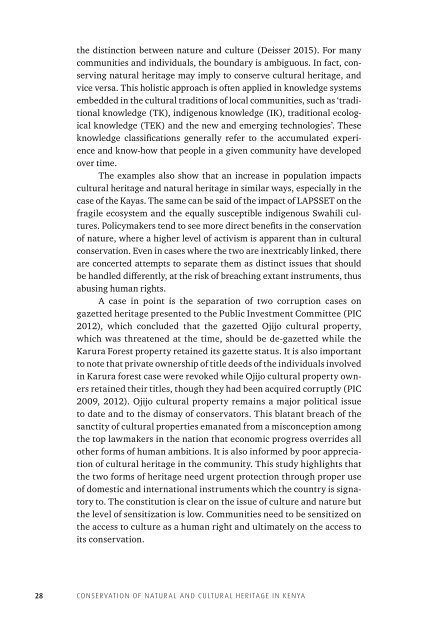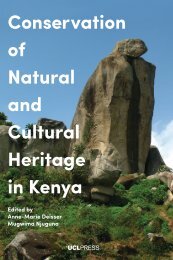Conservation of Natural and Cultural Heritage in Kenya
LtG230a0fv9
LtG230a0fv9
Create successful ePaper yourself
Turn your PDF publications into a flip-book with our unique Google optimized e-Paper software.
the dist<strong>in</strong>ction between nature <strong>and</strong> culture (Deisser 2015). For many<br />
communities <strong>and</strong> <strong>in</strong>dividuals, the boundary is ambiguous. In fact, conserv<strong>in</strong>g<br />
natural heritage may imply to conserve cultural heritage, <strong>and</strong><br />
vice versa. This holistic approach is <strong>of</strong>ten applied <strong>in</strong> knowledge systems<br />
embedded <strong>in</strong> the cultural traditions <strong>of</strong> local communities, such as ‘traditional<br />
knowledge (TK), <strong>in</strong>digenous knowledge (IK), traditional ecological<br />
knowledge (TEK) <strong>and</strong> the new <strong>and</strong> emerg<strong>in</strong>g technologies’. These<br />
knowledge classifications generally refer to the accumulated experience<br />
<strong>and</strong> know-how that people <strong>in</strong> a given community have developed<br />
over time.<br />
The examples also show that an <strong>in</strong>crease <strong>in</strong> population impacts<br />
cultural heritage <strong>and</strong> natural heritage <strong>in</strong> similar ways, especially <strong>in</strong> the<br />
case <strong>of</strong> the Kayas. The same can be said <strong>of</strong> the impact <strong>of</strong> LAPSSET on the<br />
fragile ecosystem <strong>and</strong> the equally susceptible <strong>in</strong>digenous Swahili cultures.<br />
Policymakers tend to see more direct benefits <strong>in</strong> the conservation<br />
<strong>of</strong> nature, where a higher level <strong>of</strong> activism is apparent than <strong>in</strong> cultural<br />
conservation. Even <strong>in</strong> cases where the two are <strong>in</strong>extricably l<strong>in</strong>ked, there<br />
are concerted attempts to separate them as dist<strong>in</strong>ct issues that should<br />
be h<strong>and</strong>led differently, at the risk <strong>of</strong> breach<strong>in</strong>g extant <strong>in</strong>struments, thus<br />
abus<strong>in</strong>g human rights.<br />
A case <strong>in</strong> po<strong>in</strong>t is the separation <strong>of</strong> two corruption cases on<br />
gazetted heritage presented to the Public Investment Committee (PIC<br />
2012), which concluded that the gazetted Ojijo cultural property,<br />
which was threatened at the time, should be de-gazetted while the<br />
Karura Forest property reta<strong>in</strong>ed its gazette status. It is also important<br />
to note that private ownership <strong>of</strong> title deeds <strong>of</strong> the <strong>in</strong>dividuals <strong>in</strong>volved<br />
<strong>in</strong> Karura forest case were revoked while Ojijo cultural property owners<br />
reta<strong>in</strong>ed their titles, though they had been acquired corruptly (PIC<br />
2009, 2012). Ojijo cultural property rema<strong>in</strong>s a major political issue<br />
to date <strong>and</strong> to the dismay <strong>of</strong> conservators. This blatant breach <strong>of</strong> the<br />
sanctity <strong>of</strong> cultural properties emanated from a misconception among<br />
the top lawmakers <strong>in</strong> the nation that economic progress overrides all<br />
other forms <strong>of</strong> human ambitions. It is also <strong>in</strong>formed by poor appreciation<br />
<strong>of</strong> cultural heritage <strong>in</strong> the community. This study highlights that<br />
the two forms <strong>of</strong> heritage need urgent protection through proper use<br />
<strong>of</strong> domestic <strong>and</strong> <strong>in</strong>ternational <strong>in</strong>struments which the country is signatory<br />
to. The constitution is clear on the issue <strong>of</strong> culture <strong>and</strong> nature but<br />
the level <strong>of</strong> sensitization is low. Communities need to be sensitized on<br />
the access to culture as a human right <strong>and</strong> ultimately on the access to<br />
its conservation.<br />
28<br />
<strong>Conservation</strong> <strong>of</strong> <strong>Natural</strong> <strong>and</strong> <strong>Cultural</strong> <strong>Heritage</strong> <strong>in</strong> <strong>Kenya</strong>




